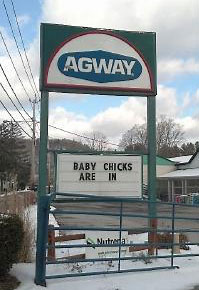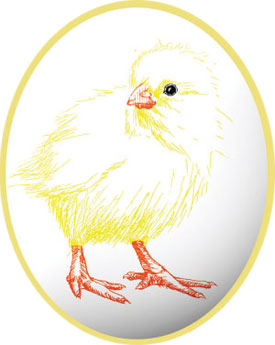The Misery of Baby “Easter” Chicks
“‘You’re not avoiding hatchery farming if you’re buying from a retailer.’ In fact, don’t buy chicks at all. Ms.
Davis said her ‘main message’ is ‘Don’t buy, don’t breed – adopt.’” –
Litchfield County Times, March 21, 2013.

Photo by Jack Coraggio/The Litchfield County Times.
A sign at the Agway on Housatonic
Avenue in New Milford.
|
When UPC member Susan van Wyck walked into her local Agway store in March, in New Milford, Connecticut, she was shocked to see baby chicks for sale. Writing
to the Litchfield County Times on March 14, she said, “These tiny animals are in two large boxes under lights, near the cash registers.
There are no places for the chicks to hide to get away from the lights and noises of the store.”
UPC president Karen Davis followed up with a letter to the editor, published on March 21, pointing out that “baby chicks do not belong in a retail
outlet and it is inappropriate to sell any animals as ‘Easter toys.’” Prompted by our letters, the Litchfield County Times wrote
an Editorial urging people to understand that chicks and ducklings “are living creatures, not toys,” and that “Taking proper care of pets
is a responsibility that children should be taught and in this respect the birds are no different than a puppy or kitten.”
Our letters enticed Litchfield County Times reporter Alice Tessier to write a story. After interviewing Sue van Wyck and Karen Davis about our
concerns, she published a front-page article titled “Baby Chicks for Sale at Connecticut Agways, Elsewhere, Not Easter ‘Toys.’” In
it, she quotes UPC’s concerns, including an excerpt from Karen Davis’s letter about the misery of motherless baby chicks being produced and
marketed by hatcheries for retail outlets like Agway and Tractor Supply:
Any sense of a parent bird carefully tending her young is lost when chicks are hatched in a mechanical incubator and displayed as if they were things
instead of lives. The surviving chicks are usually doomed to a life expectancy of a few days or weeks spent miserably. Young birds need nurturing and
rest. They are difficult to feed in a store and can suffer from starvation and dehydration that is not even noticed by the employees or by those who
buy a little chick for a child who quickly loses interest.

If you enter a store with baby chicks or ducklings for sale, urge the owner/manager to stop selling them. If you can stick to it, tell the owner/manager
you will no longer shop there until they stop. Complain to the store’s headquarters, and write a letter to the editor of your local paper to educate
readers about the cruelty these chicks and ducklings are suffering. According to Agway, each Agway store owner has the option of selling or not selling
baby chicks and ducklings, so complaining directly to the local store can make a big difference.

Contact Agway:
Agway
323 Lockhouse Road
Westfield, MA 01085
Phone: 888-658-0739
Fax: 888-703-6050
Email: www.agway.com/contact.html
Website: www.Agway.com
Contact Tractor Supply:
Tractor Supply Company
Attn: Customer Solutions Center
200 Powell Place
Brentwood, TN 37027
Phone: 877-718-6750
Email: customerservice@tractorsupply.com
Website: www.tractorsupply.com
What Else Can I Do?
Please choose compassionate vegan alternatives to eggs. The chick and duckling hatchery business is big business all year round, and chicks and ducklings
are as cheap and expendable in this business as toothpicks. For Ethical Easter Eggs, check out www.eggnots.com “Created to bring the Easter coloring experience to children & families affected by egg allergies, as well as vegan households.”